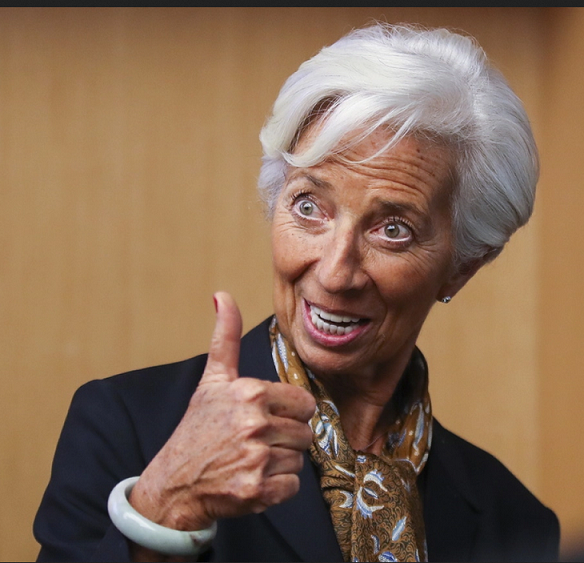Giuseppe Sandro Mela
2020-12-02.
«Lagarde had no idea what she was saying»
* * * * * * *
Lo scandalo è nato da un editoriale del The Wall Street Journal.
«Calls from Chief Economist Philip Lane to the likes of Goldman, JPMorgan, BlackRock began in March when President Christine Lagarde flummoxed traders»
«The European Central Bank’s chief economist made dozens of private calls to banks and investors after policy meetings this year, breaking with the central bank’s usual practice of delivering information to everyone at the same time in an effort to clarify its sometimes-puzzling public pronouncements, according to three people with whom he spoke and a review of his schedule.»
Poi, l’intera questione si è allargata a macchia di olio.
«News that European Central Bank chief economist Philip Lane has been speaking to banks and investors immediately after policy decisions risks renewing unease about the institution’s communications strategy days before a crucial stimulus decision.»
«Executive Board members’ diaries on the ECB website show Lane held 11 separate calls in the hours following a market-moving misstep by President Christine Lagarde in a March 12 press conference»
«The ECB announced its powerful pandemic bond-buying program six days later»
* * * * * * *
«One of the biggest lies that has bizarrely persisted over the past century is that central banks are somehow working on behalf of “the people.” Nothing could be further from the truth, unless of course one’s definition of “people” are those high net worth individuals whose assets are in the mbillions»
«And while we have repeatedly documented the often illegal sharing of inside information between the Fed and a handful of ultra-wealthy asset managers, today we get another confirmation that the ECB is no different»
««According to the report, the calls began in March, after the ECB’s completely clueless and communications-challenged President Christine Lagarde, whose most recent “success” was crushing the reputation of the IMF which lost tens of billions in its latest “bailout” of Argentina, stunned traders by suggesting at a news conference that the central bank wouldn’t prop up Italy’s bond market»
«And since it is borderline illegal for a central banker to spark any selling, and since Italian stocks and bonds slumped after her comments, this sparked a panic at the ECB where hours later the chief economist, Philip Lane placed separate calls to 11 banks and investors in which he sought to “clarify” Lagarde’s message»
«Translation: he “explained” to a highly privileged group of ultra-wealthy investors not to sell their bonds because Lagarde had no idea what she was saying, and that he would make it clear to her what she “meant to say.”»
«the calls risked privileging big investors with sensitive information»
«Of course, this is hardly the first time the ECB has gotten in trouble for sharing market-moving confidential information with a group of “close friends.”»
* * * * * * *
«Scandalo BCE: un’inchiesta del Wall Street Journal svela come il capo economista Lane stia «commissariando» Lagarde, un siluro prima dell’imminente riunione del board»
«Un siluro. Invisibile a ogni radar, perché sparato a freddo. In tempo di pace. E, di fatto, riconducibile al più classico dei paradigmi da fuoco amico»
«Il Wall Street Journal, infatti, ha reso noto come, a seguito dalla clamorosa gaffe comunicativa dello scorso 12 marzo – quando Christine Lagarde stupì la platea di giornalisti sottolineando che «la Banca centrale non è qui per calmierare gli spread» -, il capo economista dell’Eurotower, Philip Lane, abbia cominciato una serie di telefonate private verso «investitori selezionati» per «chiarire il pensiero della numero uno».»
«Di fatto, una sorta di commissariamento sotto forma di tutela politica dell’integrità e della credibilità di un’istituzione che di lì a poco sarebbe stata chiamata a compiere proprio il mandato ufficialmente negato dalla Lagarde: comprimere artificialmente gli spread più a rischio, Italia in testa, attraverso gli acquisti in deroga alla capital key del piano pandemico emergenziale, il Pepp»
«Ma, cosa ben più grave dello stesso commissariamento de facto della numero uno, il fatto che lo scoop del Wall Street Journal sveli platealmente al mercato e al mondo quello che da tutti era conosciuto come il best kept secret del sistema, il segreto di Pulcinella che nessuno osava raccontare: l’esistenza di una ristretta cerchia di soggetti privilegiati – 18, stando alla ricostruzione -, i quali possono vantare il privilegio di una linea diretta di comunicazione con la Bce»
«Fra questi sarebbero presenti – a detta della ricostruzione del WSJ e confermata da almeno tre parti in causa, ovviamente sotto forma anomima – AXA SA, BlackRock, Pimco, Citigroup, Deutsche Bank AG, Goldman Sachs Group, JPMorgan Chase e UBS Group AG»
«Quel richiamo all’indipendenza politica e al mandato statutario come unico riferimento fa pensare, quantomeno alla luce del contenuto del servizio del Wall Street Journal. Calcolando poi che il 15 dicembre, subito dopo il board, il falco Yves Mersch lascerà il suo posto in Consiglio al falco dei falchi, l’executive director della Banca centrale olandese, Frank Elderson, quello che si sta stringendo attorno all’ex numero uno dell’Fmi appare un cerchio decisamente inquietante»
«E sempre più soffocante. Isolata, screditata dal ruolo di supplente compiuto da Philip Lane sul crinale della legittimità statutaria (e ben oltre quello della ritualità), costretta a mediare in un momento in cui invece servirebbe il massimo di coesione: il barometro pare segnare tempesta»»
* * * * * * *
Come saggiamente disse Mr Putin:
«Femmina è bello nelle Amministrazioni altrui»


